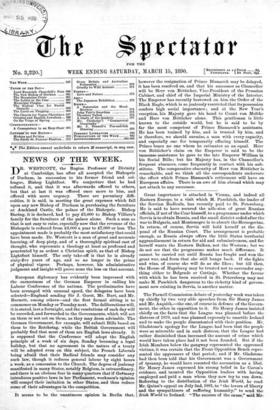European diplomacy has evidently been impressed with the earnestness of
the German Emperor in calling his Labour Conference of the nations. The preliminaries have been arranged with unusual speed, the delegates have been selected—England sending Sir J. Gorst, Mr. Burt, and Mr. Burnett, among others—and the first formal sitting is to commence on Monday or Tuesday next. The deliberations will, it is stated, last a fortnight, and the resolutions of each day will be recorded, and forwarded to the Governments, which will act on them or not act on them, as they may deem advisable. The German Government, for example, will submit Bills based on them to the Reichstag, while the British Government will probably find that most of them are English laws already. It is supposed that the Conference will adopt the English principle of a week of six days, Sunday becoming a legal holiday, but that no agreement in the nature of a treaty will be adopted even on this subject, the French Liberals being afraid that their Radical friends may consider any such law, though it reduces general labour by eight hours a week, as a concession to the Church. The degree of jealousy manifested in many States, notably Belgium, is extraordinary, and there is an obvious fear in many quarters that if Germany introduces positive laws in her Parliament, workmen's opinion will compel their imitation in other States, and thus reduce some of their advantages in the competition.






































